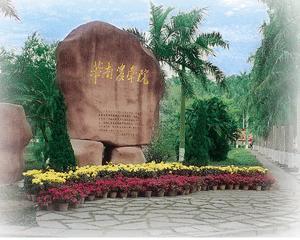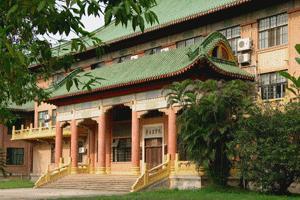A Brief Introduction to SCAU


One of the national key universities, South China Agricultural University is a “211 Project” university sponsored by both Guangdong Province and the Ministry of Agriculture during the ninth and tenth “Five-year Plan”. The university is also ranked to be “excellent” by the Inspection for Undergraduate Education organized by the Ministry of Education. Situated at Guangzhou, the “city of flowers”, the university enjoys beautiful scenery and pleasant environment. The campus covers an area of over 8250 mu (550 hectares), and the total gross floor area is over 1.34 million square meters.
The history of SCAU can be traced back to 1909 when Guangdong Agricultural Experimental Station affiliated with an Agricultural School was founded. After years of development and efforts, when the nationwide readjustments of university and college resources took place in 1952, the Station was already called the Agricultural College and became part of the National Sun Yat-Sen University. The college merged with the Agricultural College of Lingnan University and part of the Department of Veterinary Medicine as well as the Department of Pest Pathology of Guangxi University, and formed South China Agricultural College under the administration of the Ministry of Agriculture (MOA). Chairman Mao Zedong autographed the college name. The college was renamed in 1984 South China Agricultural University and was transferred under the administration of Guangdong Province in 2000 during the reform of the management system of higher learning institutions. The current CPC Secretary of SCAU Committee is Professor Li Dasheng, and the university president is Professor Chen Xiaoyang.
After a century-long development, the university has formed valuable tradition and shaped distinguished features as reflected by the university motto “Upgrading Integrity, Broadening Knowledge, Pursuing Truth, Seeking Breakthroughs”. A multi-layer educational system with graduate, undergraduate and continuing education is established. The university has 86 undergraduate programs, 9 primary disciplines authorized to confer doctorate degrees, 13 primary disciplines to confer master's degrees, 49 doctorate programs, 77 master degree programs, 6 national key disciplines (1 under construction), 5 key disciplines of the Ministry of Agriculture, 3 Guangdong provincial key primary disciplines, 14 provincial key secondary disciplines and 1 key discipline of the State Bureau of Forestry. There are 22 colleges (departments): College of Agronomy, College of Resources and Environment, College of Economics and Management, College of Horticulture, College of Veterinary Medicine, College of Engineering, College of Life Sciences, College of Animal Sciences, College of Food Sciences, College of Forestry, College of Liberal Arts and Law Studies, College of Sciences, College of Information, College of Software Engineering, College of Arts, College of Foreign Studies, College of Hydraulic and Civil Engineering, College of Public Management, Department of Ideological and Political Studies, Department of Physical Education, College of Continuing Education and the Pear River College (independent college). The total enrollment of regular students is over 41,000, comprising 36,000 undergraduates, 3,600 graduates and 66 foreign students from 29 countries.
The university is strong in its academic areas. The number of staff and faculty of the university is over 2,900, including 1 member of Chinese Academy of Sciences, 1 member of Chinese Academy of Engineering, 5 members of the Discipline Appraisal Groups of the Academic Degrees Committee of the State Council, 2 Special Professors under the “Changjiang Scholar Incentive Program”, 8 Special Professors in higher learning institutions of Guangdong Province under the “Pearl River Scholar Incentive Program”, 2 National Outstanding Youth Fund winners, 2 scholars from the “Program for Training Talents toward the 21st Century”, 5 national-level nominees for the Guangdong provincial “Thousand-hundred-ten Talent Program”, 1 winner of National Outstanding Teacher Award, and 2 National Outstanding Teaching Teams. More than 900 of the faculty are professors and associate professors, of whom, 191 are advisers for Ph.D programs and 644 for master degree programs.
The university is well equipped with teaching and research facilities. There are 9 post-doctoral research centers and 120 teaching and research laboratories, including 2 key laboratories of the Ministry of Agriculture, 2 key laboratories of the Ministry of Education, 5 Guangdong Provincial key laboratories, 4 provincial key teaching laboratories, 5 provincial key laboratories of Guangdong's higher learning institutions, 1 State Demonstration Center for Experimental Teaching, 9 Provincial Demonstration Centers for Experimental Teaching, 2 Engineering Research Centers of the Ministry of Education, 2 National Bases and 2 Guangdong provincial key Research Bases for Humanities and Social Sciences. The university has also 7 National Outstanding Courses, 17 Provincial Outstanding Courses, and 9 Provincial Brandname Majors. The New Plant Variety Testing Center (Guangzhou branch) of the MOA, the Livestock and Poultry Products Supervision and Testing Center (Guangzhou branch) of the MOA, the State Genetically Modified Crops Testing and Supervision Center (South China branch), Guangdong Rural Area Policy Research Center and Guangdong Timber and Wood Products Quality Supervision and Testing Center are all stationed inside SCAU.
The university strives to provide good learning environment for students. The Campus Net is connected to the internet at super high speed. The Modern Educational Technology Center is installed with advanced visual-audio and multi-media input-output equipment, which proves effective means for teachers and students. Other direct services for students include: an on-campus English-learning radio, an Employment Orientation Center for Graduating Students, a Work for Study Service Center, a Psychological Center and a Students' Activity Center. The collection of the university library surpasses 4.69 million copies. 19 on-campus fieldwork bases and 339 off-campus fieldwork bases are open to students. 3 stadiums with standardized synthetic rubber tracks and other specialized playgrounds are available for different sports. A convenient and delightful living and learning atmosphere is set up and students are encouraged to take full advantage of it.
Drawing on its strengths and features, the university is actively involved in international academic communications and scientific cooperations. The UNDP, FAO and WFC have attached great importance to the university and established the Regional Sericulture Training Center for Asia and Pacific and the China International Center for Agricultural Training in SCAU. The university maintains close inter-institutional links with 45 universities from 18 countries in Europe, America, Asia and the Oceania, and academic exchanges with universities from Hong Kong, Macau and Taiwan are constantly reinforced. A large number of visiting scholars come to SCAU to deliver lectures and effect exchanges each year. The university also invites foreign specialists and teachers to hold teaching posts, and sends teachers abroad to carry out researches or further their studies.
The university upholds the educational principles of the Communist Party of China and sticks to the socialist characteristics in sponsoring education. A student-first conception has been set up. The management mechanism for undergraduate students is based on students' fulfilling credits required for both a major and a minor to receive double degrees at the end of their studies. In sum, the university aims at a quality education which stresses the importance of a solid foundation and a well-balanced knowledge structure of students, and is committed to the nurturing of specialized talents with sound knowledge, wide horizon, strong ability and an innovative spirit that meet the demands of the modernization drive of China.
In the future, the university will bring into full play its advantageous location of being at the frontier of the reform and opening wave and geographically near Hong Kong and Macau. It will develop in accordance with the human resource need of “building the New Socialist Countryside” as well as “allowing Guangdong to basically realize socialist modernization ahead of other provinces”. It will adhere to the principles of “top quality on a moderate scale, cost-effectiveness based on a sound system, and development rooted in a harmonious society”. The future teaching-research university will embrace disciplines well coordinated in agriculture, engineering, liberal arts, sciences, economy, management, and law studies. Advantages in agricultural sciences will be maintained, and priority in life sciences continued. By the end of the eleventh “Five-year Plan”, the university is to step into the top-class universities in China and become internationally recognized.
News&Opinion
 more
more- Anna Pao Sohmen believes life is education
- Big Advantages for Foreign Students and Workers
- Little Confucius Talk with Foreign Confucius
- Recruitment of Foreign Students Studying in Chin...
- More people interested in Chinese Language
- Universities: Leaders or Followers?
- Chinese Community Christmas charity bazaar raise...
- Geological Museum of Central South University of...
Policy&Laws
Confucius Institute Scholarship 2013 of Xiamen U...
In order to support the development of Confucius Institutes, faci...
Welcome Foreign Students Learn in China
China will increase government-offered scholarships in order to e...
Hanban sets guidelines for Mandarin teachers
The revision of The Standards for Teachers of Chinese to Speakers...





 print
print  email
email  Favorite
Favorite  Transtlate
Transtlate 







